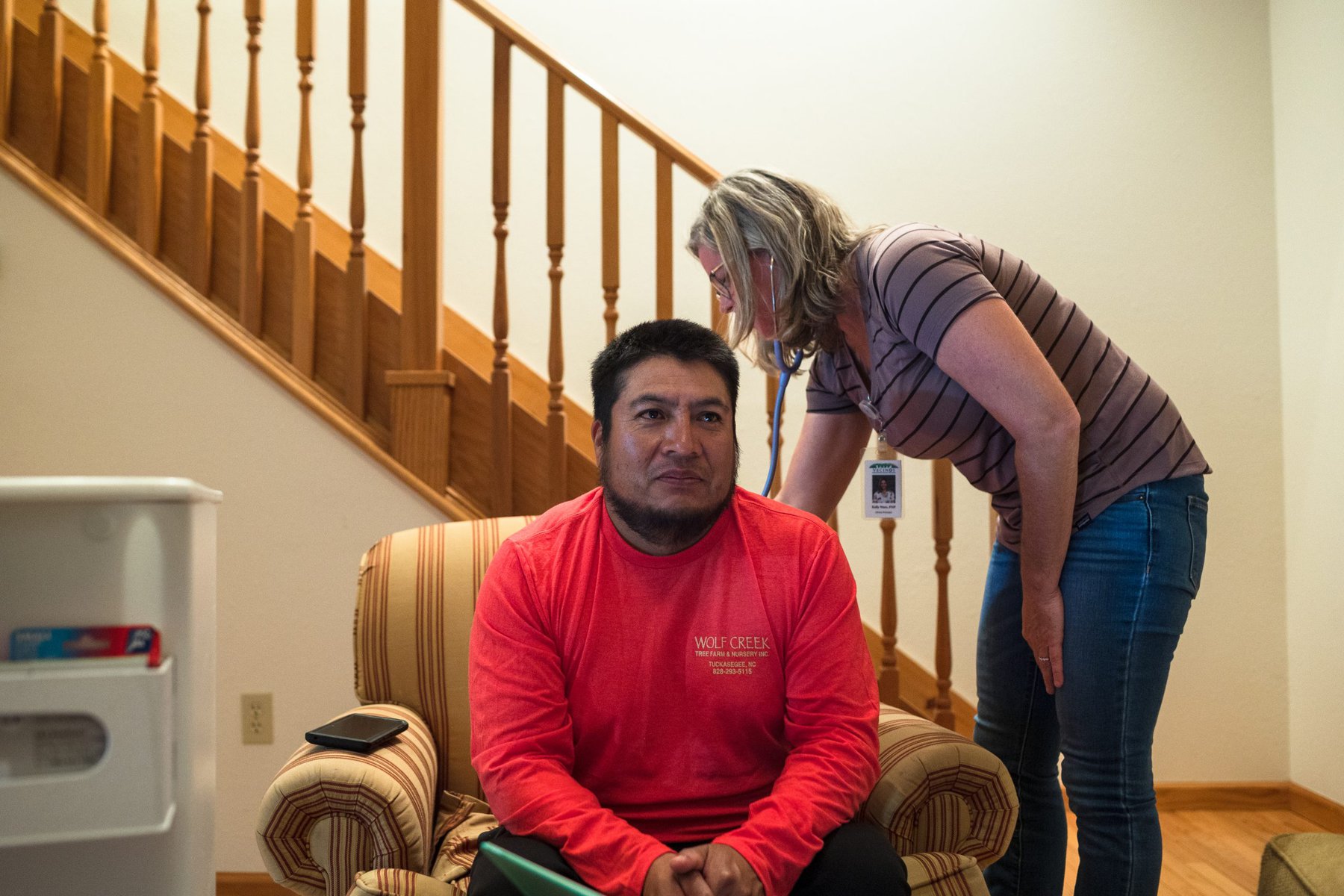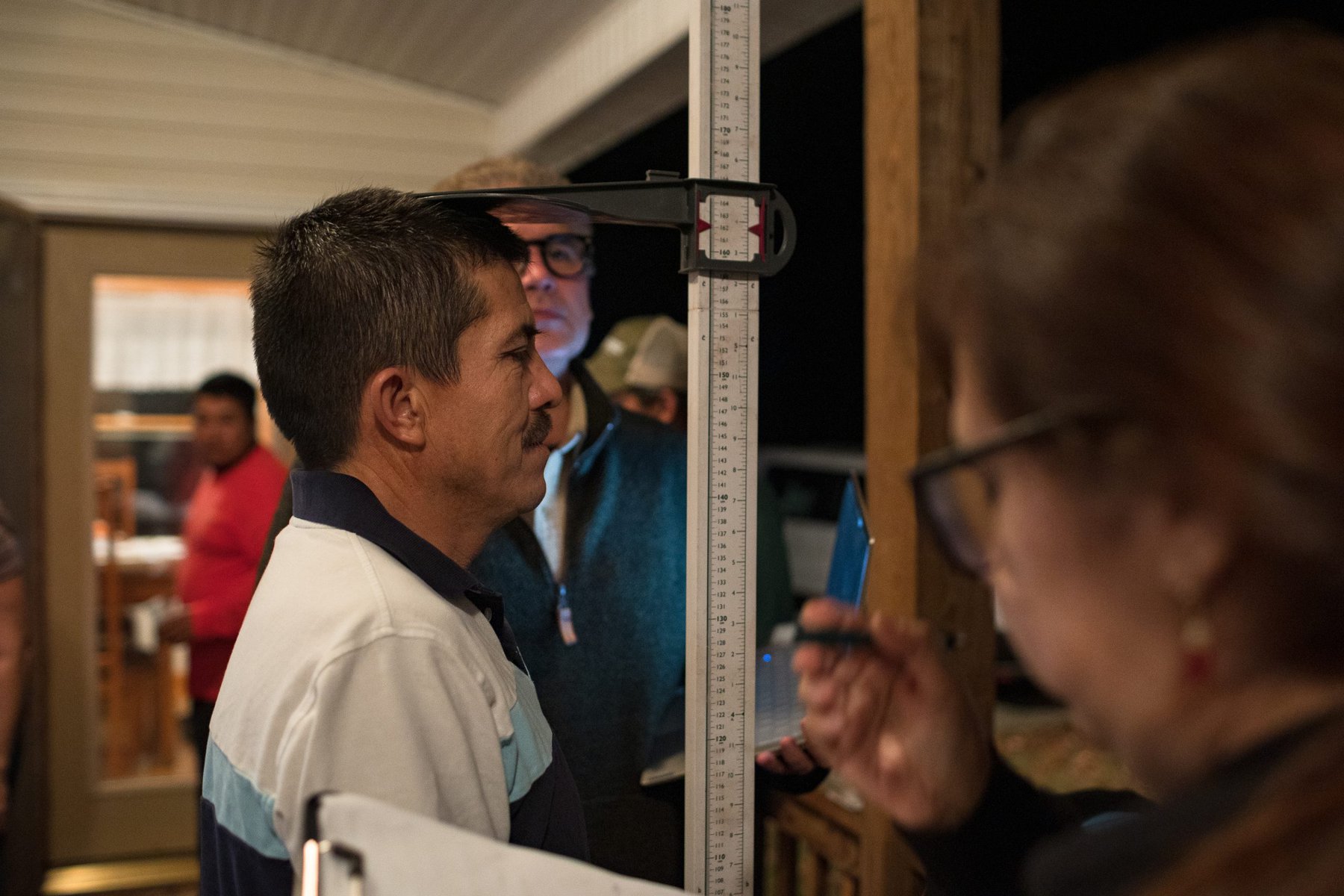This story was originally published by Carolina Public Press.
Francisco Romero has spent about nine months of every year for a decade toiling in North Carolina’s cotton and tobacco fields — or just about any other job that relies on the brawn of migrant workers to sustain the state’s $100 million farm industry.
The work is essential, he said. Without it, his family would struggle to make ends meet. Still, the distance from family exacts a heavy toll.
He was absent when his father in Guanajuato, Mexico, fell ill with Covid-19 and died. “At a moment like that, the money doesn’t make up for the loss,” said Romero, 37, from a farmhouse in the far-western mountains of Jackson County.
Farm work can be an isolating experience for migrants, who typically work and live in remote areas where the internet is unreliable or nonexistent. Workers fire off quick WhatsApp messages when they happen upon a field with cell reception, only to see it vanish in the next field over.
More typically, though, they contact family during weekly trips to buy groceries in the nearest town.
That changed for many in May 2020 when the state’s Farmworker Health Program set up internet service for migrant and seasonal farmworkers. The reasoning was that connectivity improves health, which was especially true during quarantine amid the peak of COVID-19.
The program made it possible for farmworkers such as Romero to keep in regular contact with family. Although he has been absent for most of his infant son’s first year, he has been able to follow the boy’s progress.
“My son is experiencing many changes,” Romero said, “so the occasional voice message, a photo, short video my wife sends, things like that are very essential.”
Certain health issues afflict farmworkers at notably higher rates than workers in other jobs, including heat-related illnesses and musculoskeletal injuries. The lack of internet access, which is a reality for many farmworkers, further complicates their ability to receive health care.
These workers also want for social support and family connections, and the absence of these things becomes a strain on their mental health. Indeed, according to the state’s Farmworker Health Program, 40 percent of farmworkers nationwide go through depression, while nearly a third experience anxiety at some point.
The Internet Connectivity Project established during the pandemic, devised several ways of furnishing the internet to farmworkers. The project placed hundreds of devices across the state, allowing farmworkers to schedule remote health visits using a mobile phone or another electronic device. This care method, commonly referred to as telehealth, gained wide acceptance among all kinds of patients during the pandemic.
Of the estimated 75,000 farmworkers in the state, the program served just 3,100. But among those it did reach, the response to having internet access was positive.
“Some outreach workers reported a mental and emotional shift when they were visiting workers who had been utilizing the hotspots,” said Jocelyn Romina Santillan-Deras, digital inclusion coordinator for the Farmworker Health Program, housed under the N.C. Department of Health and Human Services’ Office of Rural Health.

Outreach staff noted that migrant workers also seemed happier to see them during their visits. “Some farmworkers mentioned that there was improved communication and self-efficacy due to the hotspots and having access to the internet,” she said.
The state has been using the words “digital health” to encompass not only what is widely understood to be telehealth or telemedicine, but also remote monitoring and electronic health records, Santillan-Deras said.
“It’s a little more broad than telehealth, but it incorporates telehealth,” she said.
The state devised three ways to get farmworkers internet: internet hubs, reimbursing growers for internet services, and lending hotspots. The hotspots proved to be the easiest and the cheapest.
To set up internet in farmhouses and migrant-worker camps, the state partnered with local health organizations, and in Jackson County that organization has been Vecinos.
Based in Cullowhee on the Western Carolina University campus, Vecinos provides health care and wellness programs in Spanish and English, primarily to farmhands and seasonal workers.
Patients who can’t make it to the organization’s outpatient clinic might be reached by a mobile medical clinic, or via telehealth. The last option was made significantly easier by the connectivity project.
Kelly Ware, a nurse practitioner with Vecinos, has come to rely on telehealth for patient follow-up care. “It’s hard to get patients in for a consultation,” Ware said, “so telehealth is a big game changer to maintain contact with patients.”
Weighed down by negative news?
Our smart, bright, weekly newsletter is the uplift you’ve been looking for.Ware sees patients in the Cullowhee clinic twice a week. She and other providers drive out to hard-to-reach farmworker camps in the surrounding area as many as three times a month.
Some of the more common health issues they find include urinary infections, rashes, poison ivy, upper respiratory ailments, unchecked diabetes and high blood pressure.
Telehealth has proved useful for keeping tabs on patients with chronic conditions, Ware said.
“If they have recurring issues, I may see them in person, and then I follow up with them on telehealth,” Ware said. “We can’t bring the whole clinic out to them; telehealth is easier.”
In early November, during the last mobile clinic of the year, Ware met with about a dozen workers in a farmhouse tucked away deep in the mountains, 40 minutes southeast of Cullowhee. They had recently arrived from other farms for the Christmas tree harvest, the last job of the season before many returned to their families in Mexico.
Some of the men had blood drawn and received flu shots, while one man, who had dropped something heavy on his toe, was seen for a possible fracture. His toe was swollen, but the man couldn’t afford to miss work for a visit to the doctor, much less pay for an X-ray.

Ware suggested icing the toe and fitting it with a splint, then left him with ibuprofen for the pain. “He’s probably one that I should just follow up on … and put him on the schedule for telehealth,” she said.
Vecinos provides telehealth over the messaging app WhatsApp, in part because it is already widely used among farmworkers. Even so, the visits don’t always come off as planned.
After all, farmworkers spend long days in the field, and when they get home they cook dinner and lunch for the next day. Sometimes they are too tired for a telehealth appointment, or they forget that they had an appointment in the first place.
But telehealth still has important advantages, chief among them the flexibility of scheduling a visit in the evening or on weekends when the outpatient clinic is closed.
“I will talk to patients even if it’s off schedule,” Ware said. “I’ll talk to somebody at 12 o’clock at night on a Friday if that’s convenient for them.”
That kind of flexibility has helped Ruth Alvarado manage her high blood pressure and periodic bouts of chest pain. She lives near Sylva, about a 10-minute drive from Cullowhee, and gets by cleaning houses and making Christmas wreaths. When she feels ill, which is not infrequent, she sends Ware a text message.
“I can get the flu or worse if I don’t take care of myself,” 51-year-old Alvarado said. “I get off work late, and even if I make an appointment at the clinic in Cullowhee, I can’t get there. It’s easier for me to tell them my symptoms in a text or a phone call.”
Building on the success of the Internet Connectivity Project, the Office of Rural Health applied for and received a $6 million grant from the National Institutes of Health. It will spend the money on digital inclusion efforts that state Health Secretary Kody H. Kinsley said will “close the health care coverage gap by increasing access to care when and where workers and their families need it.”
The use of telehealth by Vecinos, like the Internet Connectivity Project, began as a way to reach patients during the pandemic. The project officially ended in March of this year, but the state will continue implementing its digital equity and inclusion activities. Funding will come from the Office of Digital Equity and Literacy, plus $6 million from the National Institutes of Health in September for the Agricultural Worker Digital Equity Initiative.
But even as telehealth has given Vecinos another avenue to reach patients, its executive director, Marianne Martinez, said the region will need more than hotspots to overcome its connectivity challenges.
“Far Western North Carolina is unique because of the extreme lack of internet,” Martinez said. Some areas are internet dead zones, where a hotspot would be useless.
“There will not be infrastructure here for a long time,” she said. “As things are now, you have to go to the top of the mountain just to send a message to family, while trying not to get eaten by a bear.”
Andres Garcia has not had a health checkup using WhatsApp or, for that matter, any other virtual platform. But in his three years working on North Carolina farms, the Jackson County farmhouse is the first time he’s had even sporadic internet connection – and it’s a boon to his mental health.
The workers do what they can to use the internet when the modem temporarily locks in on a signal. When it does, “it makes a big difference to me to see my family on a video call or hear them in a voice message letting me know how they’re doing,” Garcia said. “It puts my mind at ease knowing they are OK.”
This article first appeared on Carolina Public Press and is republished here under a Creative Commons license.











